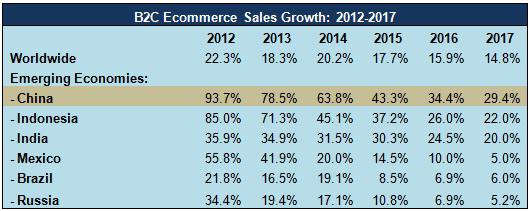Soon-to-be United Parcel Service (UPS +0.04%) CEO David Abney told Reuters earlier this month that expansion in emerging markets is "our No. 1 priority." So far the courier giant has focused more on its home market, which has led its international revenue to stagnate in the last few years. But market conditions are changing fast, and the company ultimately expects 95% of consumers to live beyond the U.S.
UPS realizes that it has to step up its international game if it wants to generate sustainable growth in the years to come. Let's find out what has changed in the market, and what United Parcel's plans are.

United Parcel Service Boeing 747-123. Source: Wikimedia Commons.
Potential in emerging markets
To understand the lure of emerging markets, let's look at some recent projections and trends:
- United Parcel Service believes that global economies will generate $50.2 trillion incremental GDP in the period between 2010 and 2025, and 74% of this growth will come from the emerging nations. In 2010, global GDP was $63 trillion, of which developed nations accounted for $40 trillion and emerging economies $23 trillion. By 2025 developed nations are likely to account for $53 trillion of GDP and emerging nations $60 trillion
- A research note by Standard Chartered Bank noted that the World Bank estimates that the world's middle-class population will triple to 1.2 billion in 2030 from 400 million in 2000. The growth will come mostly from emerging markets such as China and India. The note also mentioned that the United Nations expects 60% of the global population to be urban by 2030, compared with 52% in 2011. Asia and Africa would be at the forefront of this transition. China has already emerged as the home to the world's largest urban population
- According to research firm eMarketer, growth in the emerging markets will be driven by e-commerce boom, preference for online shopping, and eagerness of big companies to spread their brands globally. Increasing population and the choice of the Internet as a preferable medium for marketing could be the main driver for growth in the emerging economies

Source: eMarketer.com.
- The BBC has reported that, according to estimates made by CNNIC, the Chinese Internet agency, half of China's 1 billion plus population access the Internet and 302 million people shop online. Bloomberg Businessweek has reported that Hong Kong-based investment bank CLSA has predicted that India's e-commerce market will increase from its current size of $3.1 billion to $22 billion within five years
Plan of action -- China
Outside the U.S., United Parcel Service has presence mainly in Europe, which accounts for nearly half of the total international revenue, but the company is upping its game in China. UPS entered the market in 1988, following rival FedEx's entrance in 1984. Presently, it has license to deliver parcels within few important cities, but it's trying to get approvals to reach more urban areas. It has two air hubs, in Shanghai and Shenzhen.
In the past, UPS concentrated more on Chinese exports and infrastructure, but now it has started concentrating on consumption with technology, retail, industrial production, and aerospace as its target markets. Recently, the courier giant opened a new contract logistics distribution warehouse near the Beijing airport, the company's third facility after the contract logistics centers in Chengdu and Shanghai. This will allow the company to compress the processing time for all contract logistics orders throughout China.
The decision to open an additional facility was strategic. According to market research firm Transport Intelligence, China could lead the Asia-Pacific's contract logistics market by 2016, driven by increases in middle-class domestic consumption; UPS could be a big beneficiary of this growth.
Other initiatives
In 2013, United Parcel Service created a new team focused specifically on emerging markets. It has also expanded its service offering in all the 220-odd markets that it serves. The company entered into a joint venture in Vietnam, becoming the first foreign carrier to offer service in the region. It also bought a Hungarian health-care distribution company called CEMELOG. Abney, the UPS COO who takes over as chief executive on Sept. 1, said the company would continue to invest in building more capacity in emerging markets. Apart from e-commerce, the company wants to increase its presence in the health-care sector.
Foolish last thoughts
With emerging markets contributing more toward world GDP growth with every passing year, it's become imperative for UPS to increase its footprint in these nations. The company derives one-fifth of its revenue from Asia, but if the market evolves as predicted, this number can grow significantly over the coming years.
